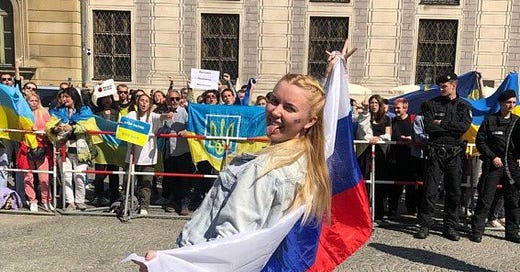Benjamin Tallis- Support the visa ban for Russians
Benjamin Tallis
Dr Benjamin Tallis is a fellow at the Hertie School’s Centre for International Security in Berlin, having previously worked at IIR Prague, IFSH Hamburg and on EU security missions in Ukraine and the Western Balkans. He specialises in the geopolitics of (in)security in Europe and is the author of a forthcoming book on the EU and its neighbourhood and migration crises.
My Comment
The thread written by Benjamin Tallis, and the articles you will find below, clearly lay out the case for a ban on visas for Russians. The EU foreign ministers are meeting right now, and the latest is that Austria may be considering some form of restriction on visas issued to Russians. That’s remarkable.
Thread: You should support the visa ban for Russians
This week (30-31/08) EU Foreign Ministers meet in Prague where they’ll discuss the visa ban. I’ve worked on issues relating to visas, borders and EU foreign and security policy for two decades.
Here’s what you need to know and why you should SUPPORT the visa ban for Russians.
You can lobby your government to support this, including on Twitter. No one (sensible) is talking about banning all Russians from EU states. For which visas would be affected see here:

So, what is the point of the visa ban?
1. To support Ukraine & shorten the war;
2. To bolster EU states' security & resilience;
3. To use our power to stand up for our democracies.
So, how does that work?
1. To support Ukraine and shorten the war:
a visa ban would be a strong show of support for Ukraine;
it would be a powerful demonstration of EU states resolve to stand up FOR Ukraine and stand up TO Russia;
it is something Zelensky has asked for and is in our power to do.
Ukraine needs our support to win.
Putin is counting on an erosion of our commitment;
a visa ban would show that we're in for the long haul & willing to bear the cost;
overmatching Russia's resolve is key to its defeat.
2. To bolster EU states' security and resilience:
by helping Ukraine, we would also help ourselves;
Russia is our no.1 threat & needs to be defeated;
until it is, we have to up our guard against increased security risks from Russians travelling to EU states visa ban.
prevent agents of influence entering the EU;
make life more difficult for those who service and support RU field agents.
But, more importantly…
we must stop 'apolitical' and pro-Kremlin Russians laughing in our faces, enjoying the benefits of our democracies while bearing no costs for maintaining them.
we must stop them abusing our freedom for their gain visa ban.
3. To use our power to stand up for our democracies:
stopping Russians enjoying our societies while their compatriots undermine them can prevent resentment in our states;
will show our citizens that we have had enough of fighting autocracies with one hand behind our backs.
To use our power to stand up for our democracies:
for too long we've fixated on liberal processes;
we need to prioritise achieving liberal outcomes;
we need to show we're not afraid to use our power for this purpose;
power begets power- a visa ban will embolden us.
BUT ... you have questions
Q1. Doesn't this rely on a 'with us or against logic'?
YES, of course & that's an essential part of war-fighting & war winning!
As Mark Galeotti put it: There are 2 wars: a military one in Ukraine and a political-economic one between Russia and the West.
We have to hold the line, to win on our front of this war so that Ukraine can win too.
We have to recognise Russia for what it is: a dangerous enemy that we must treat as such but that we can and should help vanquish.
Q2. But isn't this collective punishment? - NO.
Collective punishment is an appropriate term for something like the Nazi massacre of Czechs at Lidice. Withdrawing a privilege like EU travel should not be described in this way (and only is to wrongly discredit).
It's a collective withdrawal of privilege which is appropriate given the responsibility that Russian society bears for the regime's actions, much like Germans and Austrians bore some responsibility for the Nazi regime's crimes.
No, all migration regimes are based primarily on citizenship.
We (wrongly) withhold this privilege from many societies that aren't hostile to us;
It's more targeted than economic sanctions, as it focuses on upper middle class.
Q3. Doesn't it punish the Russian opposition & prevent them getting out?
This isn't about them. They are not the main concern here - Ukraine is.
Any unfairness in this regard is insignificant compared to the injustices visited upon Ukrainians.
While we know they oppose Putin, we often don't know what they stand FOR.
They have other ways to leave which we should encourage. It's better they make a choice, emigrate and vote with their feet.
No: we should prevent the misuse of tourist visas for humanitarian purpose and instead increase provision of existing, well scrutinised humanitarian and emigration channels putting spare capacity to use.
Q4. Isn't is unfair to demand resistance from people under threat?
Vaclav Havel (himself a dissident before becoming Czech President) was clear on this: individual decisions not to resist can be understandable given the costs.
But every acquiescence bolsters the regime.
Cumulatively, such acquiescence allows the oppressive state to performatively reproduce its power and thus to endure
This endurance has given us a Russia that butchers its neighbours & destabilised Europe.
Q5. Won't this play into the hands of Russia's propagandists?
Who cares? They say whatever the hell they want anyway, from threatening to nuke us to comparing Scholz to Hitler.
We can't fall for this strategy of reflexive control {Trying to get us to tie our own hands).
Q6. But won't a visa ban hurt the EU's transformative power in Russia?
No, because we don't have any through this channel.
In theory people to people contact is supposed to drive progressive change as in Ukraine but in practice it doesn't work with Russia.
Because there is insufficient desire for progressive change there.
Millions of visas and visits have not helped prevent Russia's slide into authoritarianism.
The status quo makes us look weak.
Q7. Isn't the point of a visa ban to help change Russia?
Not directly.
It will give a lot of wealthier 'apolitical' Russians, something to think about: why is this happening? Is Putin still worth it?
Encouraging a Russia brain drain is good but won't change anything overnight.
The only thing that might change Russia in the short term is a crushing defeat by Ukraine.
By showing our resolve a Ukrainian victory is more likely.
It gives us a future bargaining chip for progressive change.
Further reading…
Benjamin Tallis, Why Europe Should Ban Russian Tourists- The Moscow Times
The proposed Schengen visa ban on Russian tourists has attracted strong support from Europeans who resolutely oppose Russia’s brutal war on Ukraine. It has also attracted criticism, including from some Western European liberals, who see it as an unjustifiable form of "collective punishment" that would run counter to the EU’s values and interests.
Benjamin Tallis, Unleashing the Full Arsenal of Democracy- Byline Times
Free movement has been at the heart of the EU’s model of integration and its success in transforming seemingly ingrained, even structural conflict between continental powers such as France and Germany into cooperation. Encouraging contact between peoples, as well as states and businesses, helped take the danger out of difference. It allowed Europeans to recognise and pursue their common values and interests, which underpin the EU. This approach, which progressively made travel between EU states easier, culminated in the creation of the Schengen zone which allows people to move without border controls among its members.






